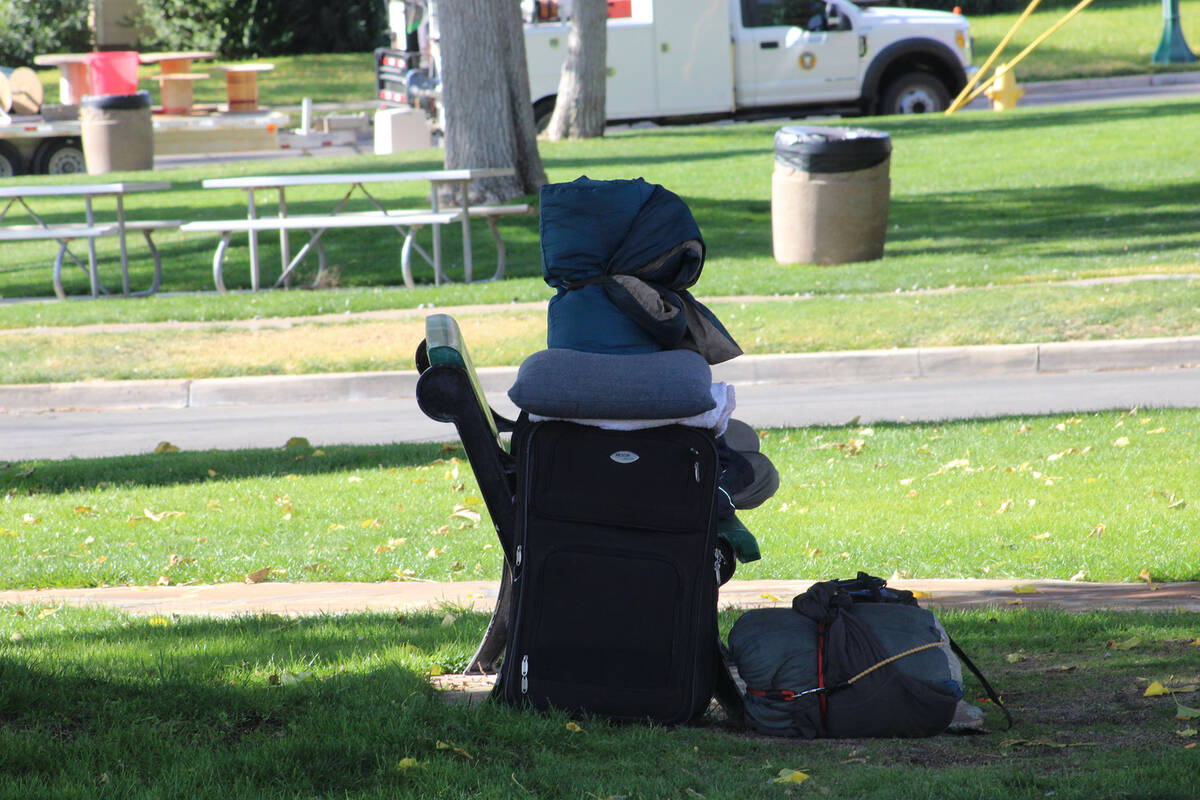
“A growing number of individuals are occupying public space across the valley and in cities all over the nation — including Boulder City — and are storing personal property and belongings in public places in a manner that causes concern and creates a public nuisance.”
With that, City Attorney Brittany Walker introduced a bill that would tighten up the definition of and prohibit camping, laying down, sleeping or storing personal property on public land in Boulder City. After very little discussion, the city council voted 5-0 to approve the changes to city code.
Based on other cities
Walker noted that the cities of Las Vegas, Reno, Henderson and Sparks, as well as Clark, Nye and Washoe counties have all passed “various punitive measures” to restrict where people can sleep or camp.
She also noted that, since 2021, the population of people camping in public places (a euphemism for the homeless) has increased by 55%.
Given the concern noted in a public town hall meeting about the issue in 2023, it may have surprised some that many more people than expected offered public comments on the issue Tuesday and all but one were opposed to the proposed ordinance.
One cited decisions by the Ninth Circuit Court of Appeals. However, that is really what is driving this and other similar laws.
In July of 2024, the U.S. Supreme Court handed down what some observers called its biggest decision on homelessness in decades. In that 6-3 decision, the court reversed the Ninth Circuit decision and found that cities can ban people from camping and sleeping in public areas. This decision opened the door for cities to pass new laws that essentially criminalize homeless individuals sleeping or storing personal property in public.
One speaker, Matt Di Teresa, who also sits on the planning commission, called the proposed ordinance “criminalizing poverty and being poor in Boulder City.”
Walker noted that this has been an issue in Boulder City for a number of years and that, starting in 2023, the fire department began partnering with the community liaison and they had made more than 150 contacts and referred 85 people to services not available locally. “But unfortunately, this just isn’t enough,” she said.
Definition changes
To be clear, camping on public land without a permit has long been illegal in Boulder City. The new ordinance essentially tightens up the definition of camping to include both sleeping and “storage of personal property.”
For example: in the original wording of chapter five of the city code, which addresses public land use, the definition of camping notes the erection of tents or other structures, the use of sleeping bags or bedding and the parking of vehicles, motorhomes or trailers for “temporary occupancy.”
The new wording expands that definition to include “Equipment or supplies that are used by a person or persons to facilitate camping, which includes but is not limited to lanterns, latrines, butane, propane, charcoal, stoves, folding tables, coolers, wagons, tents, huts, cots, beds, sleeping bags, knapsacks, hammocks, canvases or similar types of equipment or supplies.”
It also adds a section defining “contaminated property” as items visibly soiled with feces or urine, stained with blood or wet, as that presents a potential mold risk.
It also expands the definition of public parks to include undeveloped land. Note that the large majority of land within Boulder City limits consists of undeveloped desert outside of what most consider the city proper. The original code item allowed camping in undeveloped areas for periods of up to 48 hours.
The biggest changes are in the expansion of what “camping” means.
Under the new ordinance, this is expanded to include laying down, sleeping or storing, maintaining or placing personal property in public places, public buildings, the public right-of-way (i.e., streets and sidewalks) or other paths.
Under the new ordinance, stored personal property can be seized and impounded “by the appropriate city agency at any time.” Written notice is required, but all that means is that a note has to be placed on the property and then it can be impounded 24 hours later and would be sold or “otherwise disposed of” if not claimed within 30 days.
Running afoul of the new ordinance is a misdemeanor, which can result in a fine defined by state law, up to six months in jail or both.
The big issue comes down to enforcement. Mayor Joe Hardy asked about this, saying, “This is a confession. I have sometimes fallen asleep in a park. The way I read this, that is a misdemeanor.”
Walker invited Police Chief Tim Shea to the podium to address enforcement and he summed it up. “Not everyone who speeds gets stopped and not everyone who gets stopped gets a citation. Officers have a great deal of discretion on when they enforce the law and when they don’t.”
Shea also addressed the fact that increased enforcement and new laws in Las Vegas are having an effect on Boulder City. “We also interview people and ask, ‘Why are you here?’” he said. “And we have heard, ‘Well I was up in Las Vegas and the cops up there said, ‘If you don’t like it here, just go to Boulder City. No one will hassle you there.’ So that is going on.”